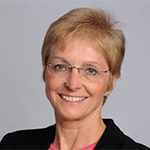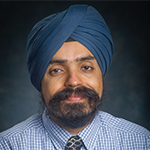Q: You say you’ve practiced in a Golden Age of treatment options. What’s the next Golden Age going to bring?
A: What I hope [for] in the next 25 years [is that] we have ways to really personalize the choices of our medications, that we find factors that allow us to predict in a differential fashion who is going to respond to what therapy. And even if we have no new therapies, if we had an answer to that question, we would be a long ways forward from where we are, where we essentially continue to do trial and error, finding the right medication or the right combinations of medications to work for our patients.
Distinguished Clinician Scholar Award
 Claire Bombardier, MD
Claire Bombardier, MD
Professor of Medicine, University of Toronto; Senior Scientist, Toronto General Hospital Research Institute, University Health Network; Rheumatologist, Mount Sinai Hospital, Toronto, Ontario, Canada
Background: When Dr. Bombardier, a Montreal native, was younger, she was interested in physics, chemistry and mathematics, but her father is a pediatrician, and she heard medicine calling. Dr. Bombardier completed her medical degree at the University of Montreal and her residency at McGill University in Montreal. She was a Robert Wood Johnson Clinical Scholar in economics and rheumatology at Stanford University in Palo Alto, Calif. And she spent 13 years as rheumatology division director at the University of Toronto before switching positions earlier this year.
Still, her background in physics, math and economics informs her work to this day. “Sometimes, progress occurs when you merge knowledge from different disciplines.”
Q: How important is it to focus on best practices and evidence moving forward?
A: Medicine is a mixture of art, tradition and science. It’s very important to keep the art and the experience in it, because not everything can be quantified in medicine, and there is a lot of intuition and understanding of human nature that has to be there. But we must make sure that what we do has evidence, that the treatments we do are safe, the treatments we do are effective and the treatments we use have sustained effectiveness.
Q: What is the biggest change you’d like to see in terms of changing the practice based on evidence?
A: There’s a revolution in the availability of actual data in everyday practice because of the introduction of electronic health records, and there is also an evolution toward big data—whether it’s from the patient, the rheumatologist, mortality registries, birth registries, cancer registries, now they are even looking at Google data. People and pharmacies are buying what kind of drugs? Does that mean there’s an epidemic of flu coming in? We need to start looking at research in a completely new way.
Henry Kunkel Young Investigator Award
 Jasvinder Singh, MBBS, MPH
Jasvinder Singh, MBBS, MPH
Professor of Medicine and Epidemiology, Staff Physician, Birmingham VA Medical Center; Director, UAB Cochrane Musculoskeletal Group Satellite Center; Director, Gout Clinic, University of Alabama Health Services Foundation; Associate Director, Gout and Hyperuricemia Center for Research and Translation (CoRT), University of Alabama at Birmingham, Birmingham, Ala.



